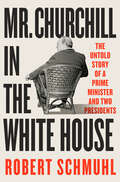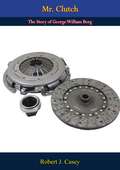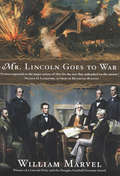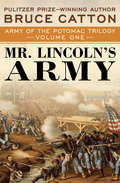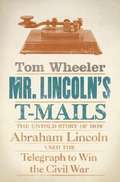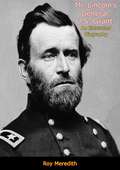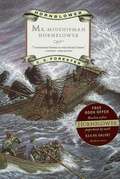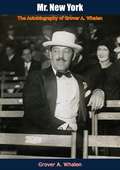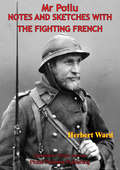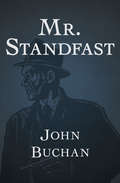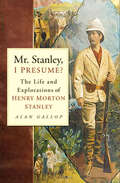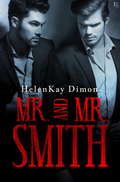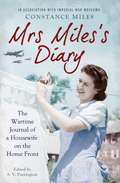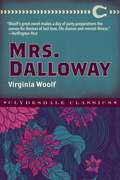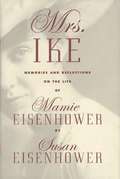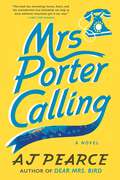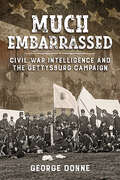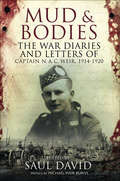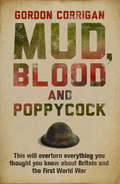- Table View
- List View
Mr. Churchill in the White House: The Untold Story of a Prime Minister and Two Presidents
by Robert Schmuhl“Robert Schmuhl admirably captures the vitality and cunning of Churchill’s D.C. residency with consummate skill, colorful anecdotes, and crisp historical analysis.” —Douglas Brinkley Well into the twenty-first century, Winston Churchill continues to be the subject of scores of books. Biographers portray him as a soldier, statesman, writer, painter, and even a daredevil, but Robert Schmuhl, the noted author and journalist, may be the first to depict him as a demanding, indeed exhausting White House guest. For the British prime minister, America’s most famous residence was “the summit of the United States,” and staying weeks on end with the president as host enhanced his global influence and prestige, yet what makes Churchill’s sojourns so remarkable are their duration at critical moments in twentieth-century history. From his first visit in 1941 to his last one eighteen years later, Churchill made himself at home in the White House, seeking to disprove Benjamin Franklin’s adage that guests, like fish, smell after three days. When obliged to be attired, Churchill shuffled about in velvet slippers and a tailored-for-air-raids “siren suit,” resembling a romper. In retrospect, these extended stays at 1600 Pennsylvania Avenue take on a new level of diplomatic and military significance. Just imagine, for example, Ukraine’s president Volodymyr Zelensky spending weeks at America’s most powerful address, discussing war strategy and access to weaponry, as Churchill did during the 1940s. Drawing on years of research, Schmuhl not only contextualizes the unprecedented time Churchill and President Franklin D. Roosevelt spent together between 1941 and 1945, but he also depicts the individual figures involved: from Churchill himself to “General Ike,” as he affectionately called Dwight D. Eisenhower, to Harry Truman, and not to mention the formidable Eleanor Roosevelt, who resented Churchill’s presence in the White House and wanted him to occupy the nearby Blair House instead (which, predictably, he did not do). Mr. Churchill in the White House presents a new perspective on the politician, war leader, and author through his intimate involvement with one Democratic and one Republican president during his two terms as prime minister. Indeed, Churchill had his own “Special Relationship” with these two presidents. Diaries, letters, government documents, and memoirs supply the archival foundation and color for each Churchill visit, providing a wholly novel perspective on one of history’s most perplexing and many-faceted figures.
Mr. Clutch: The Story of George William Borg
by Robert J. CaseyThis book, first published in 1948, is an enjoyable biography of George William Borg (1887-1960), an American industrialist, inventor, and one of the founders of the Borg-Warner Corporation. While at Borg & Beck, which was formed in 1914 by his father Victor Borg and Gary Marshall Beck, George W. Borg was instrumental in developing the first successful automobile clutch, a revolutionary clutch using a circular pressure plate that would hold well when engaged yet slip as needed when starting out. He managed the partnership, which was ultimately merged with Warner Transmission in 1922 to form Borg-Warner Corp.In 1925, Borg, who wanted his own business independent of Borg-Warner, collaborated with William Greenleaf to develop a new venture in automobile clocks. Following a brief partnership with Greenleaf Corp. from 1926-1927, Borg set up the George W. Borg Corp, whose clocks first appeared in 1928. With the Depression soon at hand, Borg’s lower-cost clocks were in demand, and soon Borg clocks were sold as factory equipment in all the major car lines, including General Motors, Ford, and Chrysler.
Mr. Lincoln Goes to War
by William MarvelAn account of how America&’s greatest crisis began, by &“the Civil War&’s master historical detective&” (Stephen W. Sears, author of Chancellorsville). This groundbreaking book investigates the mystery of how the Civil War began, reconsidering the big question: Was it inevitable? The award-winning author of Andersonville and Lincoln&’s Autocrat vividly recreates President Abraham Lincoln&’s first year in office, from his inauguration through the rising crisis of secession and the first several months of the war. Drawing on original sources and examining previously overlooked factors, he leads the reader inexorably to the conclusion that Lincoln not only missed opportunities to avoid war but actually fanned the flames—and often acted unconstitutionally in prosecuting the war once it had begun. With a keen eye for the telling detail, on the battlefield as well as in the White House, this is revisionist history at its best, not sparing anyone, even Abraham Lincoln. &“A brilliant narrative that reveals the possibilities of the past that were squandered by historical figures who seem so unassailable and godlike to us today.&” —Peter S. Carmichael, author of The Last Generation &“The most provocative account of events in 1861 in a generation. Readers who think they understand the Civil War&’s first year and the roles played by Abraham Lincoln, Nathanial Lyon, Charles Stone, and a host of others should brace themselves for a bold new perspective.&” —A. Wilson Greene, author of Breaking the Backbone of the Rebellion
Mr. Lincoln's Army (Army of the Potomac Trilogy #1)
by Bruce CattonA magnificent history of the opening years of the Civil War by Pulitzer Prize-winning author Bruce Catton The first book in Bruce Catton's Pulitzer Prize-winning Army of the Potomac Trilogy, Mr. Lincoln's Army is a riveting history of the early years of the Civil War, when a fledgling Union Army took its stumbling first steps under the command of the controversial general George McClellan. Following the secession of the Southern states, a beleaguered President Abraham Lincoln entrusted the dashing, charismatic McClellan with the creation of the Union's Army of the Potomac and the responsibility of leading it to a swift and decisive victory against Robert E. Lee's Army of Northern Virginia. Although a brilliant tactician who was beloved by his troops and embraced by the hero-hungry North, McClellan's ego and ambition ultimately put him at loggerheads with his commander in chief--a man McClellan considered unworthy of the presidency. McClellan's weaknesses were exposed during the Battle of Antietam, the bloodiest day in American military history, which ended in a stalemate even though the Confederate troops were greatly outnumbered. After Antietam, Lincoln ordered McClellan's removal from command, and the Union entered the war's next chapter having suffered thousands of casualties and with great uncertainty ahead. America's premier chronicler of the nation's brutal internecine conflict, Bruce Catton is renowned for his unparalleled ability to bring a detailed and vivid immediacy to Civil War battlefields and military strategy sessions. With tremendous depth and insight, he presents legendary commanders and common soldiers in all their complex and heartbreaking humanity.
Mr. Lincoln's High-tech War: How The North Used the Telegraph, Railroads, Surveillance Balloons, Ironclads, High-powered Weapons, and More to Win the Civil War
by Roger Macbride Allen Thomas B. AllenThis history lesson for general readership walks the reader through the American Civil War by way of the technologies that allowed Abraham Lincoln and the Union forces to triumph over the Confederacy. The text, loosely laid out in the style of a 19th century newspaper, is supported by b&w primary source materials (photographs, paintings, and political cartoons), as well as contemporary illustrations. Chapters address the involvement in the war of military mass production and the Dahlgren gun, the hot-air balloon, land torpedoes (used by the South), naval technology, photography, the Spencer Repeating Rifle, and civic constructions such as bridges and railroads, among other technologies. Annotation ©2009 Book News, Inc. , Portland, OR (booknews. com)
Mr. Lincoln's T-Mails: The Untold Story of How Abraham Lincoln Used the Telegraph to Win the Civil War
by Tom WheelerThe story of how Lincoln adapted to a new medium of communication during a period of social and technological innovation.
Mr. Lincoln’s General, U.S. Grant: An Illustrated Biography
by Roy MeredithUnmissable biography of General Ulysses S. Grant, edited and arranged by Roy Meredith, drawing mostly on material from General Grant’s personal memoirs, and richly illustrated throughout with more than 300 illustrations.“GENERAL ULYSSES SIMPSON GRANT, like Sherman, Sheridan, McPherson, Porter, Farragut, and a few others, was one of that small but excellent school of military and naval officers who made up the hard core of the Army and Navy during the Civil War. Their firm, practical grasp of their calling set them distinctly apart from the wire-pullers, glory-seekers, incompetents, and self-seeking political generals, who, having little or no military talent, resorted to cupidity, bluff, and undercover politics to further their personal ambitions.“Charles Anderson Dana, Assistant Secretary of War in Mr. Lincoln’s Cabinet, took particular notice of this when he visited General Grant’s headquarters sometime after the Battle of Shiloh. He mentioned the names of three remarkable men, whose lack of guile and of jealousy and whose devotion to duty above personal ambition made a great impression on his mind. Grant, Sherman, and McPherson, “in their unpretending simplicity,” he wrote, “were alike as three peas”“In contrast to today’s popular conception of General Grant as soldier and President is the simple fact that General Grant was indeed one of America’s greatest soldiers; a punctilious gentleman of scrupulous honesty and quiet and profound ability.”
Mr. Midshipman Hornblower (The Hornblower Saga, Book #6)
by C. S. ForesterMore adventures of Horatio Hornblower during the Napoleonic Wars.
Mr. New York: The Autobiography of Grover A. Whalen
by Grover A. WhalenSomeone has said that New York is not a city—it’s a way of life. Few men who have won prominence have better exemplified this way of life, and the things that make the New Yorker what she is today, than Grover Whalen. Born in the shadow of the Brooklyn Bridge, he became Rodman Wanamaker’s right-hand man, Mayor Hylan’s secretary and a City Commissioner, then Jimmy Walker’s Police Commissioner, and New York’s Host for 35 years and seven Mayors. The climax of his career undoubtedly was the 1939-40 World’s Fair, a $130,000,000 dream come true. Everyone has heard of Grover Whalen’s exploits, and his fashion-plate figure in an immaculate morning coat and topper has been an integral part of the scene at all the most important events of the past four decades.Through the pages of his spirited and disarming autobiography pass the great and prominent men and women of our times—kings and queens, statesmen, politicians, heroes and adventurers. Here are firsthand portraits of Albert and Elizabeth of Belgium, Marie of Rumania, George VI and the Queen Mother of England, the Prince of Wales, Churchill, and such American idols as Eisenhower, MacArthur, LaGuardia, Lindbergh, Admiral Byrd, and Gertrude Ederle. He has also known many of the controversial figures of our day, men like William Randolph Hearst and former Mayor O’Dwyer. He talks of them, and of a varied and fascinating assortment of other celebrities, freely and frankly. Here are inside stories of New York’s political world and nostalgic reminiscences of the East Side. Here too are accounts of Mr. Whalen’s trips abroad to win foreign support for the Fair; of his interviews with Mussolini and others; of vacations in Ireland, the land of his forefathers; and of a wartime mission in Alaska.He tells his story with the geniality and urbane humor that have made him famous. Few men have had as many friends everywhere as Grover Whalen: this book makes the reasons for this amply clear.
Mr. Poilu; Notes And Sketches With The Fighting French [Illustrated Edition]
by Herbert WardIllustrated with 45 pictures and vignettes many in colour.Herbert Ward was a patriotic and passionate Englishman at an unfortunate juncture in his life during the First World War, he was over 40 and would not be allowed to enlist in the British Army for service in the fields of Flanders under ordinary circumstances. However this was a minor issue when the Kaiser's German hordes advanced to within artillery range of his home in France; he at once gave over his large estate to the Red Cross and argued and created so much fuss that he was finally allowed to join the famous No. 3 Convoy of the British Ambulance Committee. He worked with at a furious rate and his work with the units, which was attached to the French army at the time, surely saved many lives of the "Poilus" that he so admired. Despite the huge burdens that work placed him under he set about recording the admirable bravery and courage of the Allied French soldiers fighting the common German foe.
Mr. Standfast
by John BuchanIn the last of his World War I adventures, Richard Hannay undertakes his most dangerous assignment yetWhen England calls, Richard Hannay answers. Not yet forty and already a brigadier general, he has led the charge into some of the fiercest fighting of World War I: Loos, the Somme, Arras. There is no telling how far up the ranks he might climb if only the Foreign Office would stop taking him off the front lines for cloak and dagger work. Adding insult to injury, Hannay’s latest clandestine mission requires him to commit the most shameful of sins in a country under siege: pacifism.In the idyllic Cotswolds, a circle of conscientious objectors has been infiltrated by a masterful German spy. To unmask the enemy, Hannay must disavow everything he holds dear. Fortunately, his old American friend John Blenkiron is also on the case, as is Mary Lamington, a brave and beautiful girl with the rare ability to turn Hannay from thoughts of war. First things first, though—before love comes duty, and the trail of treachery runs all the way from the south of England, to a pink chalet high in the Swiss mountains, to Parisian streets echoing with the roar of German guns.Published just a few months after the Allied victory, Mr. Standfast is an homage to the courage and fortitude of every patriot in His Majesty’s service. It is also one of the most thrilling and unforgettable spy novels ever written.This ebook has been professionally proofread to ensure accuracy and readability on all devices.
Mr. Stanley, I Presume?: The Life and Explorations of Henry Morton Stanley
by Alan GallopFamous for having found the great missionary and explorer Dr David Livingstone on the shores of Lake Tanganyika and immortalised as the utterer of perhaps the four most often quoted words of greeting of all time - 'Dr Livingstone, I presume?' - Henry Morton Stanley was himself a man who characterised the great wave of exploring fever that gripped the nineteenth century.
Mr. and Mr. Smith (Tough Love #1)
by Helenkay DimonSecrets and seduction make for an explosive combination in HelenKay Dimon's edgy, thrilling new series, which kicks off with a novel about two men who can handle any threat--except the one posed by desire. Fisher Braun knows how to keep a secret. As a covert paramilitary operative, his job--and his life--depends on it. He's at the top of his game, ready for action and always in control. No enemy has ever brought him to his knees, but one lover has: Zachary Allen, the man currently sharing his bed. The perfect package of brains and brawn, Zach is someone worth coming home to, and Fisher hates keeping him in the dark about what he does. But the lies keep Zach safe. Until the day Fisher loses everything. . . . Zachary Allen is no innocent civilian. Although he plays the tech geek, in reality he's deep undercover for the CIA. In a horrible twist of fate, the criminal enterprise he's infiltrated has set its sights on the man whose touch drives him wild. Zach would do anything for Fisher--except blow his own cover. Now, in order to save him, Zach must betray him first. And he needs Fisher to trust him with all his heart if they want to make it out alive. Includes a special message from the editor, as well as an excerpt from another Loveswept title.
Mrs Miles's Diary
by S. V. PartingtonAt the outbreak of the Second World War Constance Miles was living with her husband in the pretty Surrey village of Shere. A prolific correspondent with a keen interest in current affairs, Constance kept a war journal from 1939 to 1943, recording in vivid detail what life was like for women on the Home Front.She writes of the impact of evacuees, of food shortages and the creative uses of what food there was, and the fears of the local populace, who wonder how they will cope. She tells of refugees from central Europe billeted in village houses and, later in the war, of the influx of American servicemen. She travels frequently to London, mourning the destruction of familiar landmarks and recording the devastation of the Blitz, but still finds time for tea in the Strand. A woman of strong convictions, Mrs Miles is not afraid to voice her opinion on public figures and her worries about the social upheavals she feels certain to follow the war. But most of all her journals record an overlooked aspect of the conflict: the impact on communities outside of major cities, who endured hardships we find hard to imagine today. It is a fascinating document that makes for compulsive reading.
Mrs Sinclair's Suitcase: 'A heart-breaking tale of loss, missed chances and enduring love' Good Housekeeping
by Louise WaltersForgive me, Dorothea, for I cannot forgive you. What you do, to this child, to this child's mother, it is wrong... Roberta likes to collect the letters and postcards she finds in second-hand books. When her father gives her some of her grandmother's belongings, she finds a baffling letter from the grandfather she never knew - dated after he supposedly died in the war.Dorothy is unhappily married to Albert, who is away at war. When an aeroplane crashes in the field behind her house she meets Squadron Leader Jan Pietrykowski, and as their bond deepens she dares to hope she might find happiness. But fate has other plans for them both, and soon she is hiding a secret so momentous that its shockwaves will touch her granddaughter many years later...
Mrs Sinclair's Suitcase: 'A heart-breaking tale of loss, missed chances and enduring love' Good Housekeeping
by Louise WaltersForgive me, Dorothea, for I cannot forgive you. What you do, to this child, to this child's mother, it is wrong... Roberta likes to collect the letters and postcards she finds in second-hand books. When her father gives her some of her grandmother's belongings, she finds a baffling letter from the grandfather she never knew - dated after he supposedly died in the war.Dorothy is unhappily married to Albert, who is away at war. When an aeroplane crashes in the field behind her house she meets Squadron Leader Jan Pietrykowski, and as their bond deepens she dares to hope she might find happiness. But fate has other plans for them both, and soon she is hiding a secret so momentous that its shockwaves will touch her granddaughter many years later...(P)2014 Hodder & Stoughton
Mrs. Dalloway (Clydesdale Classics)
by Virginia Woolf"A revolutionary novel of profound scope and depth, about a day in the life of a woman who runs a few errands, sees an old suitor and gives a dull party. It&’s a masterpiece created out of the humblest narrative materials. . . . Woolf was one of the first writers to understand there are no insignificant lives, only inadequate ways of looking at them." —The New York Times The story follows one day of upper-class housewife Clarissa Dalloway&’s life as she plans and hosts a dinner party at her house. Along the way she meets with people from both her past—a former suitor whose proposal she rejected and whom she no longer gets along with—and her present—her distant husband, Richard; her daughter, Elizabeth; and her daughter&’s teacher, Miss Kilman, whom she despises (and who feels the same towards Clarissa). Proving herself a master and innovator of the parallel narrative, Woolf separately introduces reader to another storyline about a young veteran who was once a poet and a romantic before experiencing the horrors of war and becoming suicidal. He is diagnosed with mental illness and is being forced to separate from his wife and go to a mental asylum. Written by one of the most prolific female authors of the twentieth century, this stunning novel is often considered Woolf's magnum opus. Enjoy this beautifully rejuvenated edition of Virginia Woolf&’s Mrs. Dalloway.
Mrs. Dalloway (Signature Editions)
by Virginia WoolfIn the wake of World War I and the 1918 flu pandemic, Clarissa Dalloway, elegant and vivacious, is preparing for a party and remembering those she once loved. In another part of London, Septimus Smith is suffering from shell shock and is on the brink of madness. Their days interweave and their lives converge as the party reaches its glittering climax. Over the course of a single day, Woolf achieves an uncanny simulacrum of consciousness, bringing past, present, and future together, and recording, minute by minute, the feel of life itself.
Mrs. Ike: Memories and Reflections on the Life of Mamie Eisenhower
by Susan EisenhowerSusan Eisenhower looks back on the life of her grandmother in a tribute that coincides with the centenary of Mamie Eisenhower's birth. In this compelling biography of an army captain's wife who becomes First Lady, she paints the portrait of an independent, headstrong woman who was passionately engaged in a lifelong relationship with a man who was her utter opposite. Although their fifty-three-year marriage was ultimately marked by public triumph and private contentedness, their lives together were not always easy. On army posts all over America, in Panama and the Philippines, in Paris and Washington, Mamie Eisenhower struggled to find her way in a military system that took dedication and self-sacrifice for granted--just as she worked to keep her marriage on an even keel after the death of their first child, during debilitating illnesses, and in the midst of painful isolation when her husband was absorbed by work or committed to the battlefield. Yet as her granddaughter knew well, she radiated optimism, though people rarely recognized the discipline and fortitude behind her cheerfulness and her apparently effortless courtesy.
Mrs. Porter Calling: A Novel (The Emmy Lake Chronicles #3)
by AJ PearceFrom the author of the bestselling &“jaunty, heartbreaking winner&” (People) Dear Mrs. Bird, a charming and irresistible novel featuring aspiring journalist Emmy Lake as she navigates life, love, and friendship in London during World War II—perfect for fans of The Paris Library and Lessons in Chemistry.London, April 1943. Twenty-five-year-old Emmy Lake is doing her part for the war effort by spearheading the hugely popular &“Yours Cheerfully&” advice column in Woman&’s Friend magazine. The postbags are full, Emmy&’s guidance offers much needed support to her readers, and Woman&’s Friend is thriving. Cheered on by her best friends Bunty and Thelma, and resolute in the absence of her husband who is fighting in the army, Emmy is dedicated to helping women face the increasing challenges brought about by over three years of war. But Emmy&’s world is turned upside down when glamorous socialite, the Honorable Cressida Porter, becomes the new publisher of the magazine, and wants to change everything about it. Aided by Mrs. Pye, a Paris-obsessed editor with delusions of grandeur, and Small Winston, the grumpiest dog in London, Mrs. Porter fills the pages with expensive fashions and frivolous articles about her friends. Worst of all, she announces that she is cutting the advice column. Her vision for the publication&’s future is dreadful and Emmy is determined to fight back. Emmy and her friends must save the magazine they love, but when personal tragedy strikes, they are forced to face the very real implications of life in war-torn London. Set in 1943 but inherently resonant with how we live today, Pearce&’s signature blend of laugh-out-loud funny and heartbreakingly sad storytelling delivers a tribute to the strength of friendships. An enriching story about women coming together, Pearce&’s latest novel is the perfect tonic for our times.
Much Embarrassed: Civil War Intelligence and the Gettysburg Campaign (Wolverhampton Military Studies)
by George Donne“Lucid analysis of Union and Confederate intelligence gathering functions and services . . . a must read for its incisive rendition of the battle of wits.” —Civil War NewsBefore the first shots were fired at Gettysburg—for many, the most significant engagement of the American Civil War—a private battle had been raging for weeks. Whoever could secure accurate information on their opponent would have a decisive advantage once the fighting started. When the Confederate Army and Federal Forces finally met on the morning of 1 July 1863 their understanding of the prevailing situation could not have been more different. While the Rebel Third Corps was expecting to brush away a group of local militia guarding the town, the Federal I Corps was preparing itself for a major battle. For three brutal days, the Rebel Army smashed at the Union troops, without success. The illustrious Confederate General Robert E. Lee would lose a third of his army and the tide of the rebellion would begin its retreat. Much Embarrassed investigates how the Confederate and Union military intelligence systems had been sculpted by the preceding events of the war and how this led to the final outcome of the Gettysburg Campaign. While the success of the Confederate strategy nurtured a fundamental flaw in their appreciation of intelligence, recurrent defeat led the Federal Army to develop one of the most advanced intelligence structures in history. Lee was right to highlight the importance of military intelligence to his failure at Gettysburg, but he would never appreciate that the seeds of his defeat had been sown long before.
Mud & Bodies: The War Diaries & Letters of Captain N.A.C. Weir, 1914–1920
by Michael Weir BurnsNeil Weir died in 1967, but it was not until 2009 that his grandson, Mike Burns, discovered his diary among some boxes he had been left, and learnt that his grandfather had served as an officer in the 10th Battalion Argyll and Sutherland Highlander throughout the First World War, seeing action at Loos, the Somme and Vimy Ridge, as well as in staff and training posts. It ends with his work at the War Office during the Russian Civil War of 191920. In the diary, and the accompanying letters which have been collected from various members of the Weir family, we hear the authentic voice of a First World War soldier and get an insight into his experiences on the Western Front and elsewhere. Edited and with introductory text by Saul David, this book is one of the most fascinating accounts ever published of the First World War as experienced by the men who fought it.
Mud, Blood and Poppycock: Britain And The First World War (Cassell Military Trade Bks.)
by Gordon CorriganThe true story of how Britain won the First World War.The popular view of the First World War remains that of BLACKADDER: incompetent generals sending brave soldiers to their deaths. Alan Clark quoted a German general's remark that the British soldiers were 'lions led by donkeys'. But he made it up.Indeed, many established 'facts' about 1914-18 turn out to be myths woven in the 1960s by young historians on the make. Gordon Corrigan's brilliant, witty history reveals how out of touch we have become with the soldiers of 1914-18. They simply would not recognize the way their generation is depicted on TV or in Pat Barker's novels.Laced with dry humour, this will overturn everything you thought you knew about Britain and the First World War. Gordon Corrigan reveals how the British embraced technology, and developed the weapons and tactics to break through the enemy trenches.
Mud, Blood and Poppycock: Britain and the Great War
by Gordon CorriganThe true story of how Britain won the First World War.The popular view of the First World War remains that of BLACKADDER: incompetent generals sending brave soldiers to their deaths. Alan Clark quoted a German general's remark that the British soldiers were 'lions led by donkeys'. But he made it up.Indeed, many established 'facts' about 1914-18 turn out to be myths woven in the 1960s by young historians on the make. Gordon Corrigan's brilliant, witty history reveals how out of touch we have become with the soldiers of 1914-18. They simply would not recognize the way their generation is depicted on TV or in Pat Barker's novels.Laced with dry humour, this will overturn everything you thought you knew about Britain and the First World War. Gordon Corrigan reveals how the British embraced technology, and developed the weapons and tactics to break through the enemy trenches.
